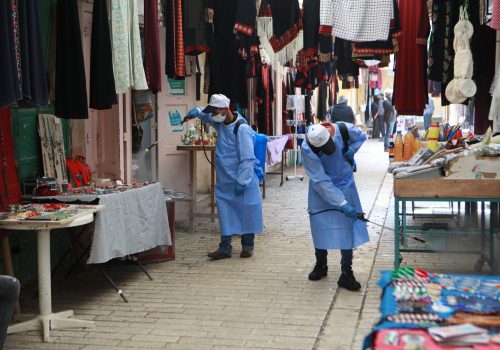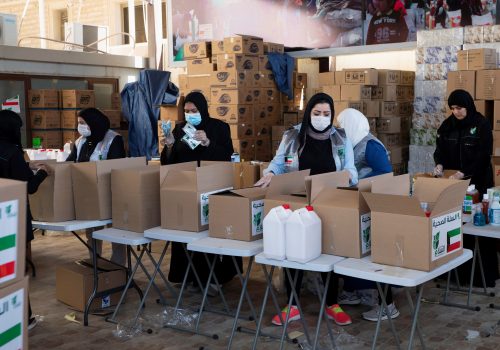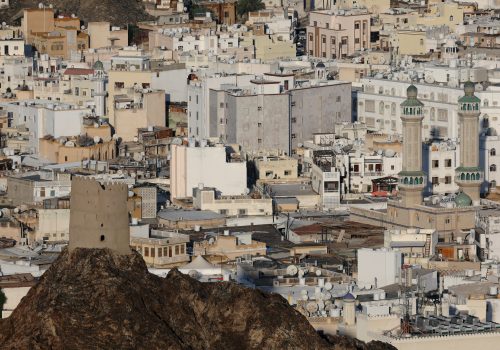Lessons the US can learn from the UAE about the decontamination of COVID-19
The COVID-19 pandemic is ushering in a new era by “hotwiring” the
fourth Industrial Revolution (4IR). “Hotwire,” in this sense, is defined by historians
as a process that forces a historical era to arrive more quickly—a new era
being defined by an exponential leap in technology in terms of velocity, scope,
fusion, and systems impact.
The speed of current breakthroughs have no historical precedent. When compared
with previous industrial revolutions, the 4IR is evolving exponentially rather
than linearly. Moreover, it is disrupting almost every industry in every
country. The coronavirus pandemic is forcing the onset of 4IR as people stay at
home and adapt to a new technological reality. Experts estimate
that the United States may have reached around a 20 percent unemployment rate, with
a permanent loss of jobs as certain types of work are not expected to revive. In
order to catalyze an economic recovery, conditions for the movement of goods
and humans must be restored. This unlocking of the lockdown should begin with
America’s disinfection.
Cleaning-up the COVID-19 pathogen is a laborious task. Since Gulf countries faced the imported virus prior to it reaching the United States, they were weeks ahead in their thinking on how to prevent a second spike in infection. The United Arab Emirates (UAE) has taken a blended civil-military approach that is worth watching, particularly, in light of the deployment of the US military in support of anti-viral measures. With Ramadan beginning April 23, the UAE’s COVID-19 military-medical/civil defense program involves a campaign that closes and disinfects mosques and Islamic facilities. Dubai completed its campaign on April 12. In the meantime, Islamic distance learning and social separation programs are being implemented, especially, during Ramadan for prayers. Laws targeting the circulation of rumors about COVID-19, such as “panic shopping,” are being rigidly enforced in order to keep civil control. Information about the program is amplified to the faithful by state-supported mosques through the seven Emirates.
The UAE Civil Defense plan calls for the country to be clean of the pathogen by the Eid al-Fitr holiday celebrating the end of Ramadan on May 25. Between now and then, COVID-19 decontamination spraying is in action across the UAE. This is enabled by a twenty-four-hour a day government restriction on movement, except, for those with an exemption granted by government permit. In Abu Dhabi, Tadweer, the emirate’s waste management company, is tasked with the national eradication of COVID-19 by using a chemical spray.
Neighboring Qatar, Kuwait, Oman, and Bahrain all have their own programs. Saudi Arabia’s military-medical model is based on Abu Dhabi’s Civil Defense model, including similar lockdown protocols and decontamination programs. Saudi Arabia quickly identified gaps in their port security and border control procedures in several locations around their boundaries, especially, in the eastern governorate of Qatif in order to stop the spread of the contagion coming from Iran by dhow.
Now that the COVID-19 program is at the stage where sanitization is possible, Abu Dhabi’s Crown Prince Mohammed bin Zayed (MBZ) is in contact with numerous world leaders concerning aid. MBZ has placed calls to Italy, Serbia, and Iraq offering assistance with efforts to combat the coronavirus. To be sure, the shape of the UAE’s soft power policy has shifted to focus on disease prevention. This is not simply in medicines, supplies, and know how—it also includes experience with methods that help governments track their citizens in a more assertive way.
The US is not going to survive the COVID-19 pandemic without huge financial, social, and political losses. The coronavirus event is predicted to peak in May, although it will take much longer to develop a vaccine. The decontamination effort, alone, will take at least three months after the peak of deaths over the summer and is likely to prolong the national agony. The inability to hold a US presidential election because of a re-emergence of COVID-19 in the fall cannot be ruled out—if that happens, it will present a major constitutional issue. Thus far, the discussion of widespread decontamination planning has not been evident in the public space. In the halls of government, these discussions should incorporate the role of the private sector, both to free up security services to do their jobs and to boost employment.
Effective decontamination spraying can only be done under lockdown conditions. Decontamination requires chemical substances like diluted hydrogen peroxide or sodium hypochlorite, along with other ingredients found in the EPA Disinfectant List released on March 13. Spraying can occur from trucks, from canisters held in backpacks, with hose and nozzle, or by autonomous device. The UAE is training civilians to be part of decontamination units that tackle the problem neighborhood by neighborhood. The United States should monitor this initiative for lessons on its implementation and scalability. Nevada Governor Stephen F. Sisolak announced on April 13 a partnership with the UAE government and Emirati tech company G42 to open high-volume COVID-19 testing facilities throughout his state—an important and noble step to, perhaps, developing a nation-wide model.
Overall, there will be no return to “normal” after the scale and scope of this pandemic. Decontamination procedures should be finalized and implemented quickly. The environmental impact is unknown but the spraying is necessary. The US Department of Homeland Security should sit down with the UAE to delve deeply into lessons the US can learn from the Emirati program before sharing them with city planners so they can begin thinking about local approaches. Equally importantly, policymakers should ensure that the next tranche of virus response funds that Congress passes includes monies for sanitizing efforts.
Dr. Theodore Karasik is the author of Toxic Warfare (2002) and worked on National Resilience Programs in the United Arab Emirates from 2006 to 2016. Dr. Karasik also researched and analyzed insurgent and terrorist health care issues at the Armed Forces Medical Intelligence Center from 1999 to 2002.
Image: Members of a medical team wearing protective suits spray disinfectants on an elevator, after a curfew was imposed to prevent the spread of the coronavirus disease (COVID-19), in Dubai, United Arab Emirates, March 27, 2020 (Reuters)


